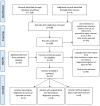The Role of Parental Concerns in the Recognition of Sepsis in Children: A Literature Review
- PMID: 31131264
- PMCID: PMC6509218
- DOI: 10.3389/fped.2019.00161
The Role of Parental Concerns in the Recognition of Sepsis in Children: A Literature Review
Abstract
Background: Sepsis is a time critical disease and outcomes strongly depend on time to initiation of appropriate treatment in hospital. A range of studies have assessed sepsis recognition in hospital settings, whereas little is known about sepsis recognition in the community. The decision-making of parents in seeking medical care may substantially impact survival of children with sepsis. An improved understanding of the parental perspective in recognizing sepsis is urgently needed to inform the design of education campaigns and consideration of using parental concerns as a trigger in sepsis screening tools. Aim: To review the literature on parental concerns in the diagnosis of sepsis in children. Methods: A literature review on parental concerns in pediatric sepsis was performed accessing publications in PubMed, CINAHL and Medline published between 1990 and 2018. In addition, we compared guidelines and online institutional sepsis recognition tools and assessed whether parental concerns were used for screening. Results: Out of 188 articles reviewed, 11 met the criteria. One article was found prospectively assessing the diagnostic performance of parental concern in children evaluated for infection, indicating high positive (16.4) and negative likelihood ratio (0.23) for sepsis/meningitis in presence of parental concerns. The role of parental concern was listed as a sign assisting recognition of sepsis in four studies reporting original data, and six reviews commented on parental concern listed as a factor upon diagnosis of sepsis. When comparing selected examples of institutional sepsis pathways available online, parental concern was variably listed as a criterion to prompt evaluation for sepsis. Conclusions: Despite some guidelines emphasizing the role of parental concern in recognizing sepsis, there is a paucity of data in the field. An improved understanding of whether parental concerns adds diagnostic value to sepsis recognition at acceptable sensitivity and specificity is urgently needed. Future prospective studies should assess whether including parental concerns in sepsis screening tools benefits the assessment resulting in early diagnosis and treatment of children with sepsis.
Keywords: child; concern; diagnosis; infection; parent; recognition; sepsis; septic shock.
Similar articles
-
Sepsis Care Pathway 2019.Qatar Med J. 2019 Nov 7;2019(2):4. doi: 10.5339/qmj.2019.qccc.4. eCollection 2019. Qatar Med J. 2019. PMID: 31763206 Free PMC article.
-
Student and educator experiences of maternal-child simulation-based learning: a systematic review of qualitative evidence protocol.JBI Database System Rev Implement Rep. 2015 Jan;13(1):14-26. doi: 10.11124/jbisrir-2015-1694. JBI Database System Rev Implement Rep. 2015. PMID: 26447004
-
Clinical Decision-Support Systems for Detection of Systemic Inflammatory Response Syndrome, Sepsis, and Septic Shock in Critically Ill Patients: A Systematic Review.Methods Inf Med. 2019 Dec;58(S 02):e43-e57. doi: 10.1055/s-0039-1695717. Epub 2019 Sep 9. Methods Inf Med. 2019. PMID: 31499571
-
A process for developing community consensus regarding the diagnosis and management of attention-deficit/hyperactivity disorder.Pediatrics. 2005 Jan;115(1):e97-104. doi: 10.1542/peds.2004-0953. Pediatrics. 2005. PMID: 15629972
-
Sepsis Screening: Current Evidence and Available Tools.Surg Infect (Larchmt). 2018 Feb/Mar;19(2):126-130. doi: 10.1089/sur.2017.250. Epub 2018 Jan 9. Surg Infect (Larchmt). 2018. PMID: 29315023 Review.
Cited by
-
"How to Recognize if Your Child Is Seriously Ill" During COVID-19 Lockdown: An Evaluation of Parents' Confidence and Health-Seeking Behaviors.Front Pediatr. 2020 Nov 17;8:580323. doi: 10.3389/fped.2020.580323. eCollection 2020. Front Pediatr. 2020. PMID: 33313025 Free PMC article.
-
Smart triage: Development of a rapid pediatric triage algorithm for use in low-and-middle income countries.Front Pediatr. 2022 Nov 22;10:976870. doi: 10.3389/fped.2022.976870. eCollection 2022. Front Pediatr. 2022. PMID: 36483471 Free PMC article.
-
Caregiver alignment with triage acuity levels and drivers for discrepancy between caregiver assessment and triage acuity levels: a cross-sectional questionnaire based study.BMC Health Serv Res. 2025 Jan 17;25(1):96. doi: 10.1186/s12913-024-12163-w. BMC Health Serv Res. 2025. PMID: 39825323 Free PMC article.
-
Neonatal sepsis: a systematic review of core outcomes from randomised clinical trials.Pediatr Res. 2022 Mar;91(4):735-742. doi: 10.1038/s41390-021-01883-y. Epub 2022 Jan 7. Pediatr Res. 2022. PMID: 34997225 Free PMC article.
-
A scoping review on pediatric sepsis prediction technologies in healthcare.NPJ Digit Med. 2024 Dec 4;7(1):353. doi: 10.1038/s41746-024-01361-9. NPJ Digit Med. 2024. PMID: 39633080 Free PMC article.
References
-
- Schlapbach LJ, Straney L, Alexander J, MacLaren G, Festa M, Schibler A, et al. . Mortality related to invasive infections, sepsis, and septic shock in critically ill children in Australia and New Zealand, 2002-13: a multicentre retrospective cohort study. Lancet Infect Dis. (2015) 15:46–54. 10.1016/S1473-3099(14)71003-5 - DOI - PubMed
Publication types
LinkOut - more resources
Full Text Sources
Miscellaneous


